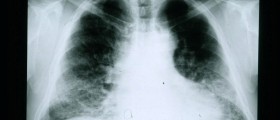
Pleurisy
Pleurisy is also sometimes called pleuritis. This condition is marked by the inflammation of the both layers of pleura and the inflammation is caused due to various infections. The lungs are a very important organ in the human body. They have the role to provide oxygen in the process of breathing. The lungs are covered with pleura that protect them from friction between them while they contract and expand when one breathes.
One layer of pleura is called visceral pleura and this layer covers the lungs, while the other layer is called parietal pleura and it represents the lining that covers the chest wall. These two layers are well lubricated with pleural fluid. When an extra fluid accumulates in the lungs, it is a condition popularly known as water in the lungs. When pleurisy occurs, certain symptoms appear and they usually affect only the lungs. Sometimes the pleurisy symptoms can be indicators of several lung diseases, such as pneumonia, tuberculosis, influenza or flu.
Symptoms of pleurisy in adults
The people who suffer from pleurisy may experience a burning sensation or a dull ache in the area around the lungs, which is followed by a sharp stubborn pain during deep breathing. Furthermore, there are cases when cyanosis appears, which is a condition when the skin color changes into bluish color. The pain in the back is usually accompanied by a stinging sensation in the neck, abdomen and shoulders. Moreover, pleurisy may cause dry cough, shortness of breath and tachypnea, which is a medical term for the rapid shallow breath. Sometimes, cough can bring up phlegm or blood can appear in it. Other signs of pleuritis in adults include the weight loss, poor appetite, fever and chills.
Causes of pleurisy
In the majority of cases, pleurisy is caused by a viral infection. However, there are certain other factors that can cause the occurrence of pleuritis. Pleurisy can be caused by a fungal infection, as well as by parasites. Tuberculosis can lead to the inflammation of the pleura. Furthermore, when certain cancers spread to the pleura, such as breast cancer or lung cancer, the pleura become inflamed.
Pleura can be affected by an injury that caused fractures of the ribs, for example. Pulmonary embolism, which is the blood clot inside the lungs, as well as the lymph nodes disorders may cause the lung tissue damage and subsequently pleurisy may occur. Pleuritis may also be caused by an improper supply of oxygen or blood to the lungs.

















Your thoughts on this
Loading...